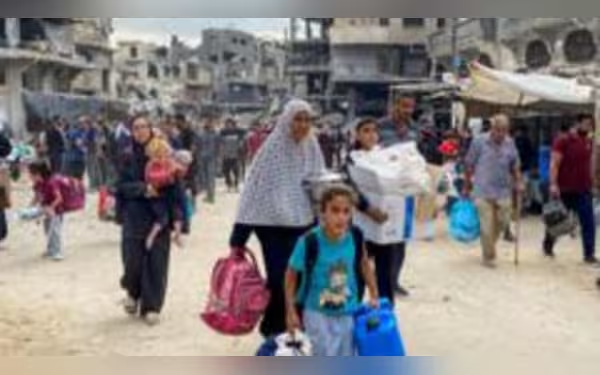Sunday, November 17, 2024 12:37 AM
Heavy Fighting in Jabalia as Israel Launches Ground Operation
- Israeli military reports 20 'terrorists' killed in Jabalia.
- Hamas claims targeted attacks on Israeli forces in the region.
- Gaza's health ministry reports severe humanitarian crisis.
 Image Credits: bbc
Image Credits: bbcHeavy fighting in Jabalia as Israel conducts a new ground operation, resulting in significant casualties and a worsening humanitarian crisis.
The ongoing conflict in Gaza has escalated significantly, particularly in the Jabalia area of northern Gaza. This region has become a focal point of heavy fighting as Israeli tanks and troops have launched a new ground operation. The Israeli military has reported that over the past day, they have killed 20 individuals whom they label as “terrorists.” Unfortunately, the violence has also claimed the life of one Israeli soldier in the northern region. In response, Hamas has claimed that its fighters have actively targeted Israeli forces in Jabalia and its surrounding refugee camp.
According to the Hamas-run civil defense agency, Israeli airstrikes have resulted in the deaths of 19 people. The situation for civilians in Jabalia, as well as in nearby areas like Beit Hanoun and Beit Lahia, is dire. The Israeli military has issued evacuation orders, urging residents to move south. They have stated that intelligence suggests Hamas is attempting to “rebuild its operational capabilities” in the area. The military has warned that the ongoing operation will involve “systematic strikes and the radical destruction of terrorist structures.”
In a troubling development, Gaza’s Hamas-run health ministry reported that Israeli forces are currently besieging the Kamal Adwan hospital in Beit Lahia, which is on the brink of running out of fuel. Patients and medical staff have been advised to evacuate, along with those in the nearby Indonesian and al-Awda hospitals. This situation highlights the severe humanitarian crisis unfolding in the region.
The conflict escalated dramatically following an unprecedented attack by Hamas on southern Israel on October 7, 2023, which resulted in approximately 1,200 deaths and 251 individuals taken hostage. Since that time, the health ministry in Gaza has reported that over 41,960 people have lost their lives due to the ongoing violence. Many civilians, like Asmaa, who have returned to their grandparents’ home in the al-Nasr district of Gaza City, are hesitant to move south. They fear that if they leave, they may never return home.
Despite assurances from Israeli officials, there is a growing concern among Palestinians that a plan proposed by Giora Eiland, the former head of Israel’s national security council, may be in the works. This plan suggests completely evacuating northern Gaza, where an estimated 300,000 to 500,000 civilians reside, and declaring the area a “closed military zone.” The intention would be to besiege the estimated 5,000 Hamas fighters in the region, compelling them to release the remaining Israeli hostages.
The situation is becoming increasingly precarious, with civilians expressing a lack of hope for a return to normalcy. Asmaa’s sentiment reflects the fears of many: “The situation is getting so dangerous that we don’t have so much hope that we’ll go back.” In addition, the Israeli military has ordered evacuations in parts of the southern city of Khan Younis after Hamas fired rockets towards Israel, resulting in injuries to two women in central Israel.
In central Gaza, the civil defense agency reported that 17 individuals, including children, were killed when an Israeli strike hit a three-storey home in the Bureij refugee camp. Medics at a nearby hospital confirmed this tragic toll. The Israeli military stated that their operations are focused on targeting Hamas operatives, claiming they conducted a precise strike on a structure used for planning terror activities.
The ongoing violence in Gaza raises critical questions about the humanitarian impact on civilians caught in the crossfire. As the conflict continues, the international community watches closely, hoping for a resolution that prioritizes the safety and well-being of innocent lives. The situation remains fluid, and the need for dialogue and peace has never been more urgent.













